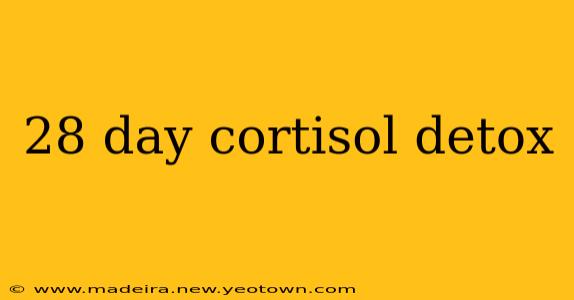Are you constantly stressed, struggling with sleep, and feeling overwhelmed? You're not alone. Modern life often leaves us with chronically elevated cortisol levels, the stress hormone that, when imbalanced, can wreak havoc on our physical and mental health. This 28-day cortisol detox plan isn't about eliminating cortisol entirely—that's impossible and undesirable—but rather about helping your body regulate its production and reduce the damaging effects of chronic stress. Think of it as a journey to rediscover balance and reclaim your wellbeing.
My name is Dr. Evelyn Reed, and for over 15 years, I’ve dedicated myself to helping patients understand and manage stress. I understand firsthand how debilitating chronically elevated cortisol can be. This plan, born from years of clinical experience and research, is designed to be a gentle guide, empowering you to make sustainable changes for lasting improvement.
What is Cortisol and Why Does it Matter?
Cortisol is a steroid hormone produced by your adrenal glands. It plays a vital role in regulating numerous bodily functions, including your metabolism, immune response, and blood pressure. Think of it as your body's natural alarm system, springing into action during stressful situations to provide you with energy and focus. However, prolonged exposure to stressors leads to consistently high cortisol levels, disrupting this delicate balance and negatively impacting your health. The key is to learn to manage stress effectively, not eliminate it.
What are the Signs of High Cortisol?
Before embarking on a cortisol detox, it's crucial to understand the symptoms. Are you experiencing any of these?
- Persistent Fatigue: Despite adequate sleep, you feel constantly tired.
- Weight Gain: Particularly around the abdomen.
- Difficulty Sleeping: Insomnia, waking up frequently, or poor sleep quality.
- Mood Swings: Irritability, anxiety, depression, or emotional instability.
- Weakened Immune System: Frequent colds, infections, or slow recovery from illness.
- Digestive Issues: Bloating, constipation, or diarrhea.
- High Blood Pressure: Consistently elevated readings.
Can a 28-Day Cortisol Detox Really Work?
Yes, a 28-day plan, combined with lifestyle adjustments, can significantly improve your cortisol levels. It's not a magic bullet, but a structured approach to address the underlying causes of stress and promote hormonal balance. Remember, consistency is key.
What Does a 28-Day Cortisol Detox Involve?
This plan focuses on four pillars: diet, exercise, sleep, and stress management.
1. Diet: Fueling Your Body for Balance
What to Include:
- Whole Foods: Prioritize fruits, vegetables, lean proteins, and whole grains. These provide essential nutrients and support adrenal function.
- Healthy Fats: Avocado, nuts, seeds, and olive oil provide sustained energy and support hormone production.
- Magnesium-Rich Foods: Spinach, almonds, and dark chocolate can help regulate cortisol production.
- Hydration: Drink plenty of water throughout the day.
What to Limit or Avoid:
- Processed Foods: These are often high in sugar, unhealthy fats, and artificial ingredients that can exacerbate stress.
- Caffeine and Alcohol: These can disrupt sleep and further elevate cortisol levels.
- Refined Sugars: These lead to blood sugar spikes and crashes, negatively impacting cortisol regulation.
2. Exercise: Moving Your Body, Calming Your Mind
Regular exercise is crucial for cortisol regulation. Aim for at least 30 minutes of moderate-intensity exercise most days of the week. Activities like yoga, walking, and swimming are particularly beneficial for stress reduction. The goal is not to exhaust yourself, but to find activities you enjoy and can maintain consistently.
3. Sleep: Prioritizing Rest and Recovery
Sleep deprivation significantly impacts cortisol levels. Aim for 7-9 hours of quality sleep each night. Establish a relaxing bedtime routine, create a sleep-conducive environment, and consider practices like meditation or mindfulness to improve sleep quality.
4. Stress Management: Learning to Cope
This is arguably the most important aspect of a cortisol detox. Identify your stressors and develop healthy coping mechanisms. Consider techniques such as:
- Mindfulness and Meditation: These help you stay present and reduce anxiety.
- Deep Breathing Exercises: These can quickly calm your nervous system.
- Yoga and Tai Chi: These combine physical movement with mindfulness.
- Spending Time in Nature: Being outdoors can reduce stress hormones.
- Journaling: This can help you process emotions and identify triggers.
Is it Necessary to Consult a Doctor Before Starting a 28-Day Cortisol Detox?
While this plan offers a general guideline, consulting your doctor before starting any new health regime is always advisable, especially if you have underlying health conditions. Your doctor can assess your individual needs and help you tailor the plan to your specific circumstances.
What are the Potential Side Effects of a 28-Day Cortisol Detox?
Some individuals might experience initial fatigue or mild withdrawal symptoms as their body adjusts to the changes. This is generally temporary. Listen to your body and adjust the plan accordingly if needed. Remember, consistency and gradual changes are key to success.
What if I Don't See Results After 28 Days?
It's important to remember that everyone is different and the effects of a cortisol detox vary. If you don't see significant improvement after 28 days, consider seeking professional guidance from a healthcare provider or a registered dietitian. They can help you identify any underlying issues and adjust your approach accordingly.
This 28-day cortisol detox is a journey, not a race. Be patient with yourself, celebrate your progress, and focus on making sustainable lifestyle changes that will benefit you in the long term. Your health and wellbeing are worth it.

